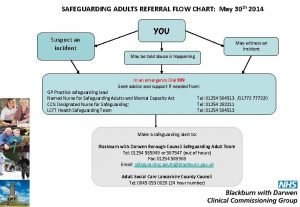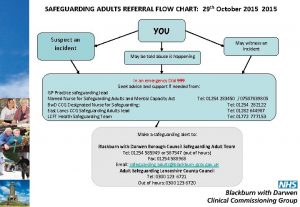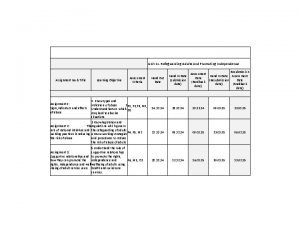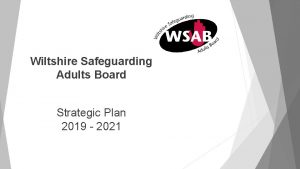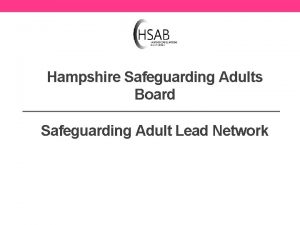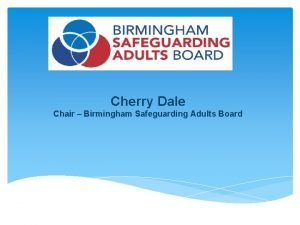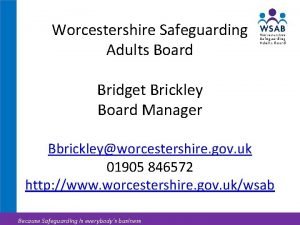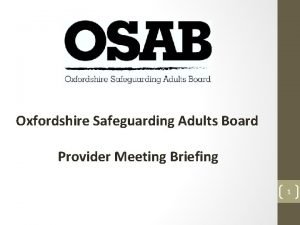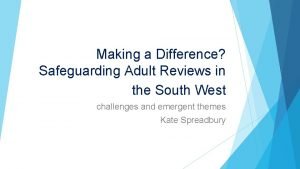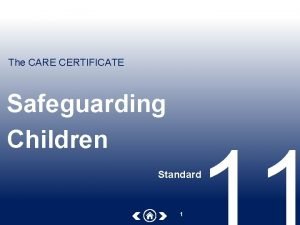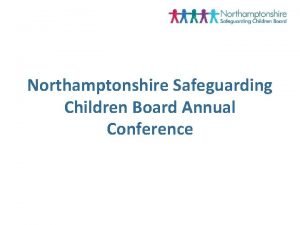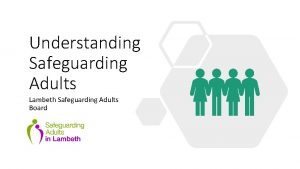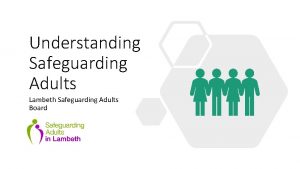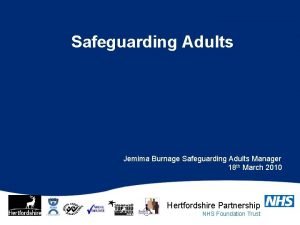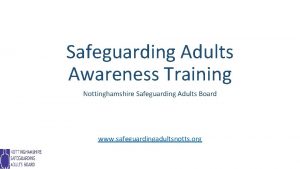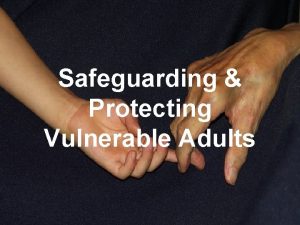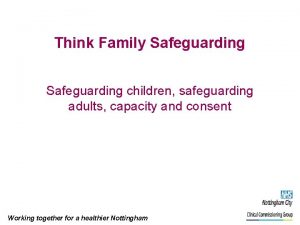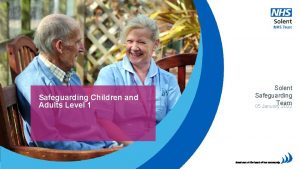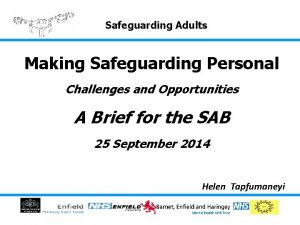Making A Safeguarding Adults Referral Adults Children and











- Slides: 11

Making A Safeguarding Adults Referral Adults, Children and Education Safeguarding Adults Team Slide 1

Safeguarding Principles 1. Empowerment 2. Prevention 3. Proportionality 4. Protection 5. Partnership 6. Accountability (Care Act 2014) Adults, Children and Education Safeguarding Adults Team Slide 2

Making Safeguarding Personal 14. 15 Making safeguarding personal means it should be person-led and outcome-focused. It engages the person in a conversation about how best to respond to their safeguarding situation in a way that enhances involvement, choice and control as well as improving quality of life, wellbeing and safety. Care Act Statutory Guidance (Updated 12/2/2018) Adults, Children and Education Safeguarding Adults Team Slide 3

Before Making A Referral ü ü Always consider if it is appropriate to make a referral Is the individual or others (including children) currently at risk from imminent harm and what actions should you be taking; ? Does your agency need to have an urgent risk assessment in place ? Do immediate protective actions need to be taken ? Is a crime suspected – if so this needs to be reported to the police by the adult at risk if they wish to do so. If they lack mental capacity you should report the crime in their best interests ? Is a child at risk – if so you need to report this to the Police or First Response Adults, Children and Education Safeguarding Adults Team Slide 4

Before Making A Referral ü ü ü ü Gather as much information as you can to help you complete the safeguarding referral Does the individual have care & support needs that stop them protecting themselves from abuse? What abuse is the individual at risk from or suffering? Speak to the individual about the referral and find out their views and desired outcomes; do they consent to a referral being made? If you feel the individual lacks capacity to make decisions and /or to participate in the safeguarding process – consider who will advocate (family/friend/advocacy service) If you have ANY doubt if a referral needs to be made or want to ask for ADVICE, call the dedicated Safeguarding Adults Team (SAT) advice line on: 0117 90 36629 Consider what outcomes the referrer wants from the safeguarding process? Adults, Children and Education Safeguarding Adults Team Slide 5

Completing The Referral Form Ø Ø Read the referral form carefully and gather all the information required before it is sent to BCC Complete every section of the referral in full with responses as detailed as possible. If you are unsure about something try to make efforts to find out; if you feel doing so would put the individual at risk or if information is unavailable, make that clear in each section it applies. If anybody continues to be at risk, send the referral regardless. *Don’t forget the SAT are happy to provide advice Consider if the person making the referral will be available to discuss or accept emails from the SAT. Where the referrer has a planned absence consider adding another contact person making sure they are aware of the concern and any actions taken Adults, Children and Education Safeguarding Adults Team Slide 6

What Happens To The Referral v S. 42 of the Care Act 2014 placed a new Duty on Local Authorities to make safeguarding enquiries v In rare cases the Local Authority may decide to carry out non-statutory safeguarding enquiries v All referrals are sent to BCC’s SAT v v v A team of Senior Practitioners and Social Workers screen and triage all adult and organisational safeguarding referrals and determine if the Local Authority have a duty to make s. 42 enquiries Referrers are notified of the outcome of the initial screen Where a s. 42 enquiry is indicated the SAT will identify the most appropriate team to complete this work and in some cases will complete the whole enquiry Adults, Children and Education Safeguarding Adults Team Slide 7

What Happens To The Referral v v All safeguarding referrals are logged on BCC’s recording information system Where there is a disagreement with any SAT decision, the referrer can contact the decision maker via their contact details (or via the Advice Line) to discuss further. Where the individual is not available another SAT member will aim to help or contact can be made with the team manager Referrers can use the BSAB Escalation Policy where they are not satisfied with a safeguarding referral response The SAT offer short training sessions on their role, responsibilities and procedures. Contact should be made with SAT to arrange this. Adults, Children and Education Safeguarding Adults Team Slide 8

Organisational Safeguarding Referrals Definition: “Including neglect and poor care practice within an institution or specific care setting such as a hospital or care home, for example, or in relation to care provided in one’s own home. This may range from one off incidents to on-going ill-treatment. It can be through neglect or poor professional practice as a result of the structure, policies, processes and practices within an organisation”. (Care Act Statutory Guidance) v v v There is no specific form for making organisational safeguarding referrals to Bristol City Council (BCC). Referrers should email concerns or telephone the Advice Line Use individual referral forms where there is a named individual at risk from organisational abuse The SAT have dedicated organisational safeguarding practitioners. Adults, Children and Education Safeguarding Adults Team Slide 9

Referral Routes Ø Individual safeguarding adults referral routes for all professionals (except some of the emergency services) is via the online form found on the BCC website: Ø Ø Ø https: //www. bristol. gov. uk/social-care-health/report-suspected-abusesafeguarding-adults-at-risk Organisational safeguarding referrals can be made via the advice line or email: Ø safeguardingadults. bristol. gov. uk Ø 0117 9036629 The services for whom exceptions have been agreed should send the paper referral to: Ø adult. care@bristol. gov. uk Adults, Children and Education Safeguarding Adults Team Slide 10

Contacts Ø Ø Police: 101 Bristol City Council (adult safeguarding info) https: //www. bristol. gov. uk/en_US/socialcare-health/report-suspected-abuse Ø SAT Email (for advice or individual team contacts): safeguardingadults@bristol. gov. uk Ø SAT Advice Line: 8. 30 am – 5. 00 pm Mon - Thurs & 8. 30 am – 4. 30 pm Fri: 0117 9036629 Ø Children at risk: o o Ø Immediate concerns: Police - 999 First Response Referrals: https: //www. bristol. gov. uk/en_US/social-carehealth/report-concern-about-child-for-professionals Bristol Safeguarding Adults Board (BSAB) https: //bristolsafeguarding. org/adults/ Adults, Children and Education Safeguarding Adults Team Slide 11
 Safeguarding referral process flowchart
Safeguarding referral process flowchart National referral mechanism-flowchart
National referral mechanism-flowchart Unit 11 safeguarding adults and promoting independence
Unit 11 safeguarding adults and promoting independence Wiltshire safeguarding board
Wiltshire safeguarding board Safeguarding adults hampshire
Safeguarding adults hampshire Birmingham safeguarding board
Birmingham safeguarding board Worcestershire safeguarding adults board
Worcestershire safeguarding adults board Birmingham safeguarding adults board
Birmingham safeguarding adults board Oxfordshire safeguarding adults board
Oxfordshire safeguarding adults board Somerset safeguarding adults board
Somerset safeguarding adults board Safeguarding children care certificate
Safeguarding children care certificate Northamptonshire safeguarding board
Northamptonshire safeguarding board
